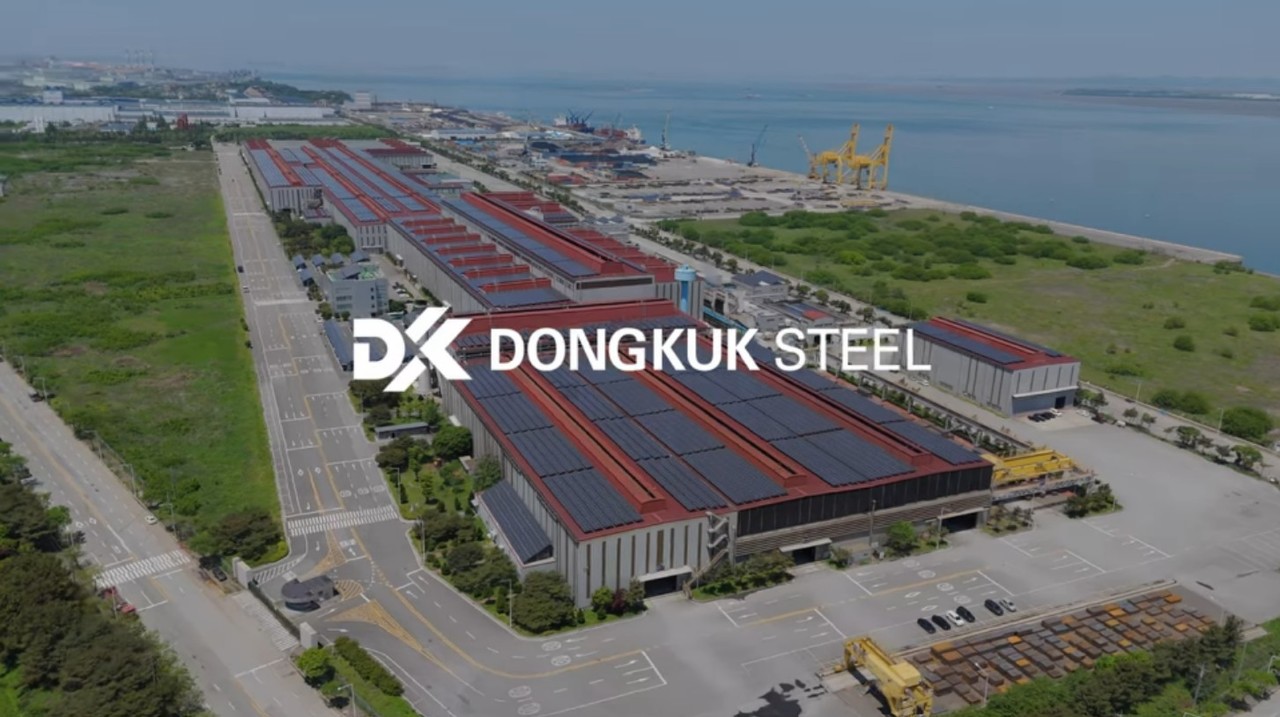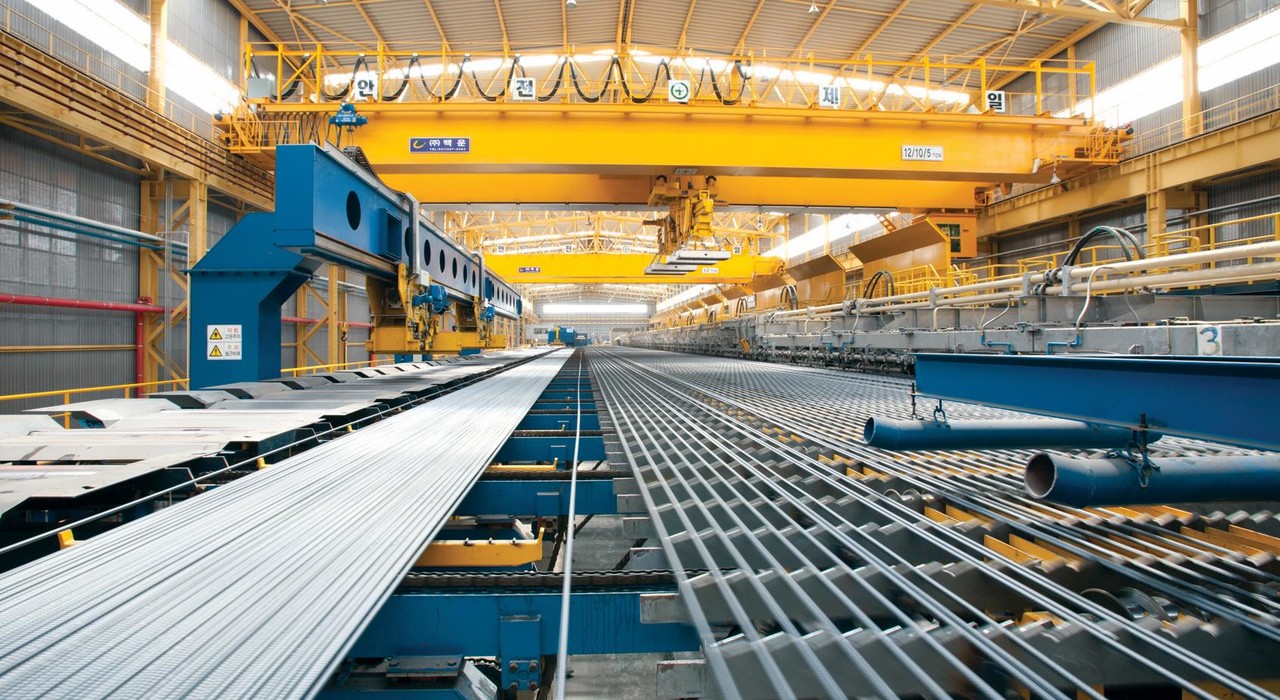Triple burden of sluggish demand, rising electricity costs, and raw material prices prompts strategic shutdown

Dongkuk Steel, operator of South Korea’s largest rebar production facility, has announced a temporary halt in operations at its Incheon plant for nearly a month.
According to a disclosure made on the 26th, the company will suspend all rolling and steelmaking processes at its Incheon site from July 22 to August 15. The move is expected to reduce rebar supply by approximately 200,000 tons. Dongkuk Steel cited “oversupply adjustment” as the official reason for the production suspension.
The Incheon plant is a key production base for Dongkuk Steel, accounting for 40% of its total revenue. It produces around 2.2 million tons of rebar annually—roughly 17% of South Korea’s total rebar output of 13 million tons. Equipped with two electric arc furnaces and two rolling lines, the facility focuses on manufacturing long steel products such as rebar, H-beams, and angle bars for construction and civil engineering applications.
However, prolonged stagnation in the construction sector has caused a sharp decline in demand, exacerbating an already chronic supply glut in the steel industry. Despite typically strong spring-season demand, no rebound materialized this year, signaling a deepening market slump.
The industry is also grappling with external cost pressures, including industrial electricity surcharge hikes and rising raw material prices, particularly for scrap metal. Korea Electric Power Corporation (KEPCO) raised industrial electricity rates by an average of 9.7% in October last year, significantly impacting steelmakers that rely heavily on electric arc furnaces.

Faced with these compounded challenges, Dongkuk Steel has opted for a strategic shutdown aimed at reducing electricity costs during the summer peak period and restoring supply-demand balance in the market. The decision reflects more than cost-cutting—it is seen as a measure to stabilize the industry ecosystem.
A Dongkuk Steel official stated, “Due to a construction sector downturn, we lowered our factory’s operating rate to 60% last year and to 50% earlier this year. With no signs of recovery, we’ve decided to bring that rate down to zero for the time being.”
The company emphasized that it will continue to supply pre-contracted volumes using its existing inventory, ensuring no disruption to customers.
“Depending on market conditions in August, we may have to consider extending the shutdown if oversupply persists,” the official added. “We can no longer delay decisions aimed at addressing excess inventory and market imbalance.”
Similar production cutbacks are taking place across the steel industry. Hyundai Steel, for instance, shut down its entire rebar production line at its own Incheon plant in April. At the time, the company clarified that it was not a routine maintenance shutdown, but a response to deteriorating market conditions. “Despite short-term losses, the move was necessary to stabilize supply and restore normal market operations,” Hyundai Steel said.
Dongkuk Steel’s complete shutdown stands as a symbolic indicator of the crisis gripping the domestic steel industry, as companies take increasingly aggressive steps to survive amid collapsing demand, oversupply, and rising costs.
Picture=Dongkuk Steel
추천 뉴스
- 1 김문수, 尹 영화 관람 행보에 "선거 의혹 완전히 일소하도록 노력할 것" 김문수 국민의힘 대선 후보는 윤석열 전 대통령의 부정선거 다큐 관람에 대해 선거의 공정성 해명이 필요하다고 밝혔다. 당내에서는 부정선거 음모론 확산에 대해 강한 경계심을 표명하며 극우 세력과 선긋기를 강조하고 있다.
- 2 스타벅스, "이재명-김문수" 닉네임 금지 이유는? 스타벅스가 대선 후보들의 이름을 닉네임으로 금지한 이유는? 정치적 중립을 위한 제한 조치, 그 기준과 논란의 배경은 무엇일까
- 3 '동물 복지 강화' vs '산업 육성' , 1500만 반려인구 사로잡을 공약은? (MHN 이건희 인턴기자) 2025년 6·3 대통령 선거가 가까워지면서 반려동물 정책이 주요 쟁점으로 떠오르고 있다.반려인구가 1,500만 명을 넘어선 가운데, 반려동물과 사람이 조화롭게 공존하는 사회를 만들기 위한 각 후보의 구체적인 정책 방향과 공약에 이목이 집중되고 있다. 이와 관련해 국민의힘과 더불어민주당이 21일 나란히 보도자료와 SNS를 통해 반려동물 관련 공약을 발표했다.두 후보의 정책 방향은 다소 차이를 보이지만 공통적으로 반려동물과 사람이 함께 행복한 사회를 만들 것을 약속했다.김문수 후보와 이재명 후보가 제시한 반
- 4 공언련, 언론노조 직격…“정의당도 손잡겠다는데 왜 편향인가” (MHN 주진노 기자) 임응수 변호사의 코바코 비상임이사직을 둘러싼 논란이 격화되고 있다.지난 6일, 공정언론국민연대는 민노총 언론노조 코바코 지부가 한국방송광고진흥공사(코바코) 비상임이사로 재직 중인 임응수 변호사의 퇴출을 요구하며 투쟁에 돌입한 것에 대해 강하게 비판했다.언론노조 측은 임 변호사가 과거 서부지법 사태 가담자를 변호했으며, 최근 국민의힘 산하 ICT방송미디어정책특위 ‘MBC 공정성 회복 및 공영방송 민노총 저지분과’ 위원으로 위촉된 점을 들어, 정치적 중립성과 공공성을 훼손했다고 주장하고 있다.이에 언론노조는 임
- 5 트럼프 관세 유예 발표, 엔비디아 주가 18.7% 급등...기술주 살아남을까 9일(이하 미국 현지시간), 도널드 트럼프 미 대통령이 주요 교역국에 상호관세 부과를 90일 유예할 것을 발표하면서 글로벌 증시에 또다시 변동을 일으켰다. 이와 같은 규제 완화의 소식은 투자자 불안감의 진정으로 이어졌고, 이는 이번 주가 급등의 원인으로 작동된 것으로 보인다.
- 6 중국 떠나는 애플...31조 원치 아이폰, 인도에서 만들었다 트럼프가 전자제품 관세 면제 부정했으나, 중국을 향한 별도 관세는 유지된다. 이에 대한 애플은 아이폰 생산을 인도로 옮기며 전세기 긴급 수송까지 감행하며 관세 회피 전략 본격화가 시작됐다.
- 7 '관세 폭탄' 트럼프의 상호관세 부과…세계 경제 흔든다 도널드 트럼프 미국 행정부가 상호관세를 부과하며 글로벌 경제에 큰 영향을 미칠 것으로 예상된다. 유럽, 아시아 등에 걸쳐 국가들이 보복 조치를 예고하고, 세계 경제는 경기침체 위험에 직면했다.
- 8 홍준표, "대선 끝난 후 돌아간다는 입장 변함없다"... 선대위 합류 불발 홍준표 전 대구시장이 김문수 특사단을 돌려보내며 국민의힘 선대위 합류 요청을 일축했다.
- 9 '애들도 보는데...' 광주 이정효 감독, 어린이날 과도한 지도와 공개 질타에 논란 (MHN 금윤호 기자) K리그1 시도민구단 최초 아시아축구연맹(AFC) 챔피언스리그 8강 진출을 달성하며 지도력을 다시 한번 인정받은 광주FC 이정효 감독이 애제자를 향한 과도한 행동으로 연일 도마에 올랐다.광주는 어린이날인 지난 5일 광주월드컵경기장에서 열린 하나은행 K리그1 2025 12라운드 홈 경기에서 김천상무를 1-0으로 꺾고 5위(승점 19)에 올랐다.이날 승리로 광주는 최근 공식전 3연패에서 탈출하면서 반등의 계기를 마련할 수 있게 됐다. 그러나 이날 경기는 승리보다 지켜보던 이들의 주목을 끄는 장면이 나왔다. 전반전이
- 10 딥시크 국내 서비스 재개, 챗GPT와 기능-요금-보안 차이는? (MHN 조민서 인턴기자) 중국 생성형 인공지능(AI) '딥시크(DeepSeek)'가 국내 서비스 재개를 공식화하며 글로벌 AI 시장에서 '챗GPT(OpenAI)'와의 본격적인 대결 구도가 형성되고 있다.딥시크는 28일(현지시간) 한국어 개인정보 처리방침 공개 및 국외 이전 거부권(옵트아웃) 도입 등 일부 시정 조치를 완료한 뒤, 구글 플레이스토어와 애플 앱스토어를 통해 다운로드 서비스를 재개했다.개인정보보호위원회의 권고에 따라 개인정보 이전 거부 기능을 추가하고, 개인정보 처리방침을 한국어로 고지했다. 다만, 과거 수집된 데이터의
